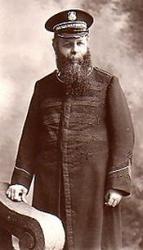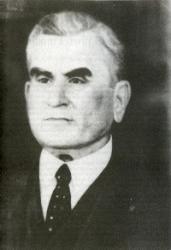
1825 - 1909 Meter: 10.4.10.4.10.10 Author of "Thy Word, O Lord (Midlane)" in The Cyber Hymnal Midlane, Albert, was born at Newport, Isle of Wight, Jan. 23, 1825, and was engaged in business in that town for many years. To his Sunday school teacher he ascribes the honour of prompting him to poetic efforts: and the same teacher did much to shape his early life. His first printed hymn, "Hark! in the presence of our God," was written in September, 1842, at Carisbrooke Castle, and printed in the Youth’s Magazine in November of the same year. Since then he has written over 300, and of these a large proportion are in common use. They appeared in magazines and small mission hymn-books, including:—
(1) The Youth's Magazine; (2) The British Messenger; (3) The London Messenger; (4) Trotter's Evangelical Hymn Book, 1860; (5) The Ambassador's Hymn Book, 1861; (6) Second edition of the same, 1868; (7)Hymn Book for Youth; (8) Good News for the Little Ones, 1860; (9) William Carter's Gospel Hymn Book, 1862; and several other works of a similar kind.
In addition to several small works in prose, Mr. Midlane has gathered his verse together from time to time and published it as:—
(1) Poetry addressed to Sabbath School Teachers, 1844; (2) Vecta Garland, 1850; (3) Leaves from Olivet, 1864; (4) Gospel Echoes, 1865; (5) Above the Bright Blue Sky, 1867; (6) Early Lispings, 1880.
Of the hymns contained in these works nearly 200 have been in common use from 1861 to 1887, the most popular being "There's a Friend for little children." The hymn-books, however, in which many of them are found are usually very small, are used in what are commonly known as Gospel Missions, and have gradually given way to other and more important collections. We therefore append only those hymns which are at the present time in use in official or quasi-official hymn-books, or such collections as have a wide circulation. Those hymns which are omitted from the following list may be found in the works given above, and especially in the Gospel Echoes. The bracketed dates below are those of the composition of the hymns.
i. Given in Trotter's Evangelical Hymn Book, 1860.
1. How sweet the cheering words. (Aug. 1860.) The Gospel.
2. Lord Jesus, save! (July 1860.) Lent.
ii. Given in The Ambassador's Hymn Book, 1861.
3. Angels rejoice o'er sinners saved. (Aug. 1860.) Joy in Heaven over Repenting Sinners.
4. Come to the royal feast. (Aug. 1860.) The Gospel Feast.
5. Father, bless the heavenly message. (Aug. 1860.) Divine blessing implored.
6. How vast, how full, how free. (Aug. 1860.) Divine Mercy.
7. I am not told to labour. (June 25, 1860.) Salvation by Faith.
8. Jesus died upon the tree. (Aug. 13, 1860.) Good Friday.
9. Lord, prepare the hearts of sinners. (Aug. 28, 1861.) Preparation of the heart.
10. Not all the gold of all the world. Peace through Jesus.
11. Now we'll render to the Saviour. (Sept. 1, 1861.) Praise for Salvation.
12. O what a gift the Father gave. (Aug. 22, 1860.) The Gift of The Son.
13. O what a Saviour is Jesus the Lord. (Aug. 29, 1861.) Jesus the Saviour.
14. Passing onward, quickly passing. (Sept. 10, 1861.) Prepared?
15. Salvation, Lord, is Thine. (Aug., 1860.) Salvation through Jesus.
16. Sinner, where is room for doubting? (Sept., 1861.) Expostulation.
17. Soft the voice of mercy sounded. Grace.
18. The perfect righteousness of God. (Sept. 21, 1861.) God our Righteousness.
19. There is a throne of grace. (Sept. 14, 1860.) The Throne of Grace.
20. We speak of the mercy of God. (Sept. 19, 1861.) Divine Mercy.
iii. Given in W. Carter's Gospel Hymn Book, 1863.
21. Can any say, I do believe ? (Aug., 1860.) Assurance in Christ.
22. If Jesus came to seek and save. (Oct., 1861.) Salvation in Jesus.
iv. Given in Leaves from Olivet, 1864.
23. See the blessed Saviour dying. (Oct. 5, 1860.) Good Friday.
24. Sweet the theme of Jesus' love. (April 22, 1862.) The Love of Jesus.
v. Given in Gospel Echoes, 1865.
25. Come and welcome to the Saviour. (June 8, 1862) Invitation.
26. God be gracious to a sinner. (May 21, 1861.) Lent.
27. God speaks from heaven; in love He speaks. (July, 1860.) Love and Mercy of God.
28. Hark! the cry, Behold He cometh. (June 8, 1862.) Advent.
29. He saves because He will. (April 20, 1862.) The "I Wills" of Jesus.
30. How solemn are the words. (Aug. 1, 1865.) The New Birth.
31. Himself He could not save. (Sept. 1861.) Good Friday.
32. I once was bound in Satan's chains. Pardon.
33. Jesus lived. He lived for sinners. (Jan. 4, 1862.) Easter.
34. Jesus never answered "Nay." (May 13, 1862.) Jesus always the same.
35. Jesus the blessed centre is. (June 8, 1862). Father glorified in the Son.
36. Jesus, the risen Saviour. (July 31, 1862.) Easter.
37. Jesus, the soul that trusts in Thee. (May 7, 1864.) Salvation through Jesus.
38. Look, poor sinner, look to Calvary. Good Friday.
39. Lord, when I think upon the love. (Oct. 1, 1860.) The Love of Jesus.
40. Peace with God ! How great a treasure (Oct. 18, 1861.) Peace.
41. Salvation! What a precious word. (Nov. 22, 1861.) Salvation.
42. Scripture says Where sin abounded. (March 3, 1862.) Abounding Grace.
43. Shall Jesus' love be spoken? (May 4, 1862.) Love of Jesus.
44. The Lamb was slain, the blood was brought. (Aug. 24,1862.) The Passover.
45. The silver trumpets sounding. (May 7, 1862.) The Year of Jubilee.
46. There is a rest for weary souls. (Dec. 4, 1863.) Rest. Peace in Jesus.
47. 'Tis the voice of mercy calls thee. (Nov. 5, 1861.) Mercy.
48. When the Saviour said "'Tis finished" (Oct. 1861.) Good Friday.
49. When God begins His gracious work. (Dec. 27, 1860.) God Unchangeable.
50. Who can praise the blessed God ? (Oct. 1861.) Praise for Salvation.
51. Why those fears, poor trembling sinner. Safety in Jesus.
vi. Given in the Ambassador's Hymn Book, 2nd ed., 1868.
52. Life from the dead, eternal life. (Oct. 11, 1867.) Work of the Holy Spirit.
53. Stern justice cries for blood. (March 2, 1867.) The Atonement.
vii. Various.
54. Apart from every worldly care. (June 1866.) Prayer Meetings. Written for Spurgeon's Our Own Hymn Book 1866.
55. Be not weary, toiling Christian. (Feb. 1857.) Encouragement. In the British Messenger, Sept. 1857.
56. Eighteen hundred years ago. (Aug. 1859.) Fulness of Time. In the London Messenger, April, 1861.
57. Father, for Thy promised blessing. (Feb. 20, 1860.) Outpouring of the Spirit desired. In The Revival, July, 1860.
58. God bless our Sunday School. Sunday School Anniversary. First printed in the Baptist Children's Magazine, July, 1844. It has passed into numerous collections for children, but usually st. ii. is omitted, thus reducing it to 3 st.
59. He comes! He comes! the Bridegroom comes. (Sept. 9, 1850.) Advent. In The Present Testimony, 1851.
60. Kept by the power of God. (May 6 ,1858.) Security in God. In the London Messenger, Sept., 1860.
61. Let the waves of blessing roll. (Jan. 6, 1868.) Missions. In the Enlarged London Hymn Book, 1873.
62. Lord, 'our waiting spirits bow. (June, 1866.) Prayer Meetings. Written for Spurgeon's Our Own Hymn Book 1866.
63. Love us freely, blessed Jesus. (July 2, 1858.) Lent. In the Churchman's Penny Magazine. Oct., 1858.
64. Never perish! words of mercy. Mercy in Christ. Printed in the monthly Girdle, June, 1857, and in the British Messenger, Aug. 1857, in 4 double st. In the collections it is reduced to the first two stanzas.
65. No separation, O my soul. (May 6, 1863.) Perseverance. In the British Herald, Aug., 1863.
66. Nought but the voice of God can speak. (Jan. 29, 1863.) All things are of God. In the 1873 Appendix to Snepp's Songs of Grace & Glory.
67. Now, O joy, my sins are pardoned. Pardon and Peace. (Nov. 9, 1860). Printed in the London Messenger, March, 1861, then in the Gospel Echoes, 1865; and then in several hymn-books. The original began, "Once I sang, but not in earnest." Usually st. ii., iii., of 8 l, are given as "Now, O joy, &c."
68. O art thou an heir of glory? (June 4, 1861.) Cautions. In Hymn Book for Youth, 1862.
69. O what a glorious truth is this. (Aug. 3, 1860.) Jesus Died. In the London Messenger, Sept., 1860.
70. Once it was mine, the cup of wrath. (Aug. 8, 1860.) Wrath and Pardon. In the London Messenger, Oct., 1861.
71. Onward, upward, heavenward. (Feb. 7, 1860.) Pressing Onward. In the London Messenger, March, 186l.
72. Perennial spring of pure delight. (March 17, 1864.) Jesus All in All. In the London Messenger, Jan., 1865.
73. Sheltered by the [Thy] sprinkled blood. (Sept. 23, 1863.) Safety in Jesus. In the London Messenger, Feb. 1864.
74. Showers of blessing, gracious promise. (April 19, 1862.) Missions. In the London Messenger, Aug., 1862, and Leaves from Olivet, 1864.
75. The Church of God, amazing, precious thought. (July 6, 1857.) The Church. In The Present Testimony, 1858, and Leaves from Olivet, 1864.
76. The whispers of Thy love divine. (May 3, 1868.) Love of God. In the Island Greeting, Oct., 1872.
77. Though billows round me roll. (April 2, 1853.) Trust. In Food for Christ's Flock, 1853.
78. 'Tis finished, cried the dying Lamb. (Feb. 21, 1850.) Good Friday. In the Baptist Children's Magazine, 1850).
79. Tis heaven where Jesus is. (Oct. 23, 1862.) Joy and Peace in Jesus. In the Enlarged London Hymn Book, 1873.
80. Together all things work for good. (Aug. 14, 1860.) All work for Good. In the Enlarged London Hymn Book, 1813.
81. Waiting for Jesus, and loving while waiting. (Jan. 9, 1872.) Second Advent desired. In the 1873 Appendix to Snepp's Songs of Grace & Glory.
82. Without a cloud between. (Mar. 18,1862.) Jesus, Face to Face. In the London Messenger, June, 1862.
83. Yet awhile; how sweet the thought. (Dec, 1864.) Second Advent desired. In theLondon Messenger, 1865.
The collections in which these hymns are mainly found are Spurgeon's Our Own Hymn Book, 1866; Snepp's Songs of Grace & Glory, 1872-3; Hurditch's Enlarged London Hymn Book, 1873, and smaller books for Evangelical mission work. Of Mr. Midlane's hymns as a whole, Miher's estimate that "His hymns are full of spiritual thought, careful in their wording, and often very pleasing without reaching the highest form of poetical excellence " (Singers and Songs, p. 572), is just. A marked feature of these hymns is the constant and happy use of Scripture phraseology.
--John Julian, Dictionary of Hymnology (1907)
========================
Midlane, A., p. 733, ii. Mr. Midlane published in 1901 The Bright Blue Sky Hymn Book, of 315 of his hymns, and the same year The Gospel Hall Hymn Book, for use in the Gospel Hall, Newport, I.W., with 218 additional, making 533 original compositions. A broad-sheet of seven special hymns for Jewish children, in connection with the Mildmay Mission to the Jews, was also issued in December, 1904. Other publications previously noticed give, with these, over 800 hymns to Mr. Midlane as his contribution to the hymnody of the Church.
--John Julian, Dictionary of Hymnology, New Supplement (1907)
Albert Midlane


 My Starred Hymns
My Starred Hymns





